Killer Whales of Western Australia
Why Bremer Bay Is Their Seasonal Home
Every summer, off the wild southern coastline of Western Australia, a remarkable gathering takes place. Hundreds of killer whales, or orcas, converge in the deep waters off Bremer Bay. From December to April, the remote Bremer Canyon becomes a stage for hunting, socialising and scientific discovery. It is one of the few places on Earth where visitors can reliably encounter these apex predators in the wild.
Why Bremer Bay?
The secret lies beneath the surface. The Bremer Canyon is a massive submarine system stretching thousands of metres deep into the continental shelf. Here, cold, nutrient-rich water rises from the abyss — a process called upwelling. This natural event fuels blooms of plankton that support fish, squid and whales. For killer whales, it is a seasonal feast.
These conditions make Bremer Bay a biological hotspot. Orcas return year after year, drawn by abundant prey and stable ocean currents. The area’s remoteness and pristine environment also help sustain this delicate balance between predator and ecosystem.
The science behind the sightings
Since Naturaliste Charters began operating expeditions in Bremer Bay, scientists have documented more than 200 individual orcas across several pods (Project ORCA). Through photo-identification, drone observation and acoustic recording, researchers now understand more about the behaviour and communication of these animals than ever before.
Each pod has its own culture — distinct hunting methods, dialects and family hierarchies. Some specialise in hunting squid, while others target beaked whales or tuna. This diversity of feeding behaviour highlights the adaptability and intelligence of killer whales in the Southern Ocean (NOAA Fisheries).
The social side of orcas
Watching orcas in Bremer Canyon is like glimpsing into a parallel society. Females lead their pods, passing knowledge through generations. Calves are nurtured and taught to hunt cooperatively. Playful displays, spy-hops and breaches reveal complex social interactions that go far beyond survival.
Scientists believe this intricate social structure is key to their success. It allows Bremer Bay orcas to coordinate hunts with precision and communicate across large distances. These behaviours have earned them the reputation of being the ocean’s most intelligent and strategic predators.
Changing oceans, shifting patterns
While Bremer Bay remains a sanctuary, global ocean changes are influencing whale movements. Warming waters and shifting prey distributions could alter the timing or scale of future gatherings (Whales and Climate Programme). Monitoring these changes helps researchers predict how killer whales may adapt in coming decades.
By joining a Bremer Bay Killer Whale Expedition, you contribute to that ongoing research. Passenger observations and photographs often assist scientists in identifying individuals and understanding pod dynamics over time.
A natural spectacle beyond comparison
Every expedition into the Bremer Canyon offers a new story. The journey to the feeding grounds aboard Alison Maree passes rugged cliffs and the meeting point of two mighty oceans. Out at sea, anticipation builds until a tall black dorsal fin cuts through the waves. Then, suddenly, the Southern Ocean comes alive.
Pods work together to chase prey, juveniles mimic adults, and birds swirl overhead in a frenzy of motion. It is pure nature — unpredictable, powerful and unforgettable. Encounters like these inspire a deep respect for the fragile balance of the marine world.
Protecting Western Australia’s orcas
Naturaliste Charters is proud to collaborate with marine researchers and conservation organisations to study and safeguard this unique population. By combining eco-tourism with science, every Bremer Bay Orca Tour helps raise awareness and protect the region’s biodiversity. Responsible whale watching ensures minimal disturbance while maximising educational value for guests.
Understanding the role of killer whales in Western Australia’s ecosystems reminds us that preserving their habitat benefits all marine life — from plankton to whales and everything in between.
Plan your encounter with the ocean’s apex predator
The Bremer Canyon Killer Whale Expedition Season begins each December, continuing through to April. Departing daily from Bremer Bay Boat Harbour, tours are led by expert marine biologists who bring the science of the canyon to life.
Join Naturaliste Charters — Western Australia’s original orca operator — and witness the world’s most powerful predator in its natural environment. It is more than whale watching; it is a window into one of the ocean’s most complex ecosystems.
References
-
Project ORCA Australia – Bremer Canyon Research Initiative
-
NOAA Fisheries – Killer Whale (Orca) Information
-
Whales and Climate Programme – Whales and Climate Research
-
CSIRO Marine Research – Southern Ocean Ecosystem Dynamics



